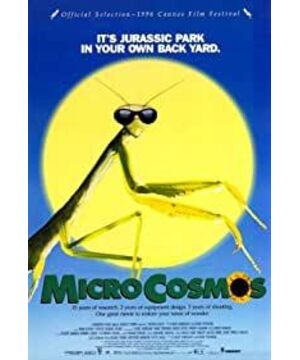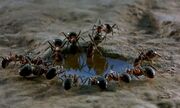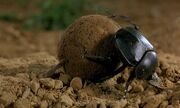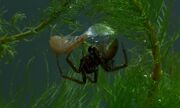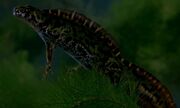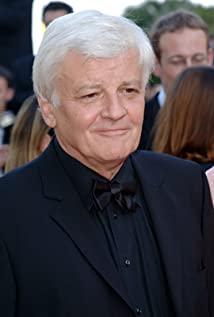In "The Migration of Birds", I was already surprised at the rarity of voiceovers, but I didn't expect the narration in "Insect World" to be even more sympathetic to the sound. Only at the very beginning of the film, when the camera continues to push into the depths of a dense grassy sea, does a short two-minute voice-over appear:
"Dawn, in a meadow somewhere, there is a world of insects hidden here... …For insects, the smallest rock can become a mountain, and the smallest puddle is as vast as an ocean. Here, time flows in another way: an hour is a day; a day is a season; a season is a life. For To understand the world, we should learn to listen to their whispers quietly.
After that, there is no more unnecessary words in the film. The whole film allows the picture and sound to speak for themselves, using beautiful pictures and realistic foley to magnify the world of insects in a tiny size before our eyes.
In the early morning, a dew-covered caterpillar gently climbed on a wet grass;
a fat green bug filled the whole picture, with a funny face and a naive look;
a red The full seven-star ladybug crawled over a leaf, the background was blurred, the picture was simple in bright red and soft grass green, and the angle of the composition was very particular;
a few ants surrounded a large dew, the water droplets were round and crystal clear, gradually slide.
...
The film uses delicate lens language to tell us the life of insects from morning to night, from land to water, and let us see the life of a group of neglected little creatures realistically. In a corner that we don't pay attention to, in another time domain, these bugs are also trying to live, day after day, busy with their livelihoods in a miniature world, experiencing wind and rain, and encountering love and life and death:
In the music of Ding Ding Dongdong, a group of ants are diligently foraging for food: some are pulling small ears of wheat with all their strength; some are excitedly holding a sunflower seed; some are pulling a full corn kernel , some holding a small dandelion. They are pulling and dragging the useful things they can find, carefully storing them in the warehouse;
in the soundtrack of the military rhythm, a dung beetle proudly pushes a dung ball into the camera, it moves swiftly and pushes Incredibly fast. When going uphill, it turned its head down, and its hind feet struggled to reach the top; a barb appeared in front of it, digging deeply into the dung ball. The poor dung beetle pushed left and right, using the top of his hind feet and pushing with his big head, arching almost three feet into the ground. Finally, it finally pushed the dung ball out of the thorn and pushed it all the way forward. The camera zoomed further and further, and when it was restored to the real scale, the huge dung ball was just a tiny piece of soil.
With the small size of insects, their lives are threatened at any time. A pheasant is a terrifying giant in the eyes of ants; a spider with an open web can mummify a locust with silk; a carpivore can kill bees. It's silent; an inconspicuous rain is enough to wreak havoc on the insects' homes. Watching these tiny insects live in such a dangerous world, I suddenly understood the narration of the film: "For them, the smallest stone can become a mountain, and the smallest puddle is as vast as the ocean."
Adding a lot of color to the film is its music. The music in "The Migration of Birds" also seems to be by Bruno Coulais, who often uses the humming of the human voice to express the pure and peaceful atmosphere.
In the clear female voice singing, two snails intertwined and lingered. They carefully stretch out their tentacles, test each other, and bounce off quickly, just like the nervousness and shyness of human beings when they first encounter love. After that, they are gentle and lingering, blending together. In the increasingly high music, we realize that the snail is constantly flying in love. This set of pictures is so touching that a friend told me that he once had a small yard at home, and every year he would kill a lot of snails for the flowers in the yard. But since watching this set of pictures in "Insect World", he has never touched a snail again.
The most amazing is the music of a pair of caterpillars marching. After the rumble of percussion, suddenly there is a very funny rhythm and rustling music. A group of hairs are connected head to tail, like an army. Worms take over the picture. They move in unison and crawl in unison. After that, one team became two teams, and the two teams became a circular circle, squirming in an arch. The order of the bugs reminds me of the tight organization and disciplined people in the human world.
I watched this film three times, and the more I watched it, the more I felt that the world of bugs was not a miniature human society? And isn't the human world an enlarged world of insects? Just like the dung beetle who pushed the dung ball hard, in its view, the dung ball was extremely huge and precious, and it paid all its strength for it. In our view, it is just a dung ball; if we look at it from another angle, in this bustling world, a group of people who run for profit, women and houses also feel that what they are pushing and chasing is It is so important, but if there is a god, when he stands in the sky very high and sees this group of busy and excited people, in his eyes, what is the difference between these people and the dung beetle who pushes the dung ball?
View more about Microcosmos reviews


